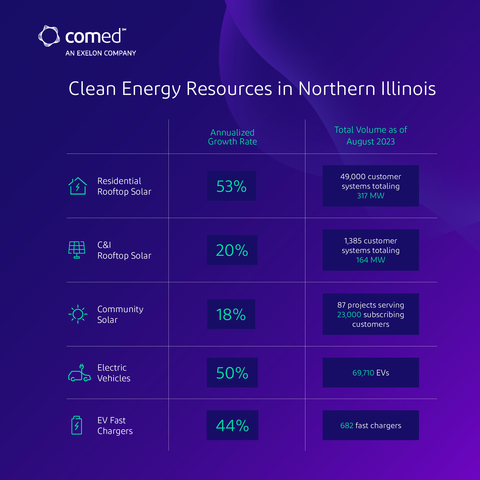More than 51,000 distributed energy resources now connected to ComEd smart grid
The future of solar energy is bright in northern Illinois as ComEd today announced that more than 51,000 Distributed Energy Resources (DER) have been connected to its smart electric grid as of September, including more than 49,000 residential rooftop solar systems and related energy storage facilities. This is a substantial increase from 837 rooftop solar systems connected to the ComEd grid in 2016, reflecting an annual growth rate of 53%. Year to date, ComEd has received a record volume of nearly 15,000 applications to connect solar resources to its grid, and through September, nearly 11,000 systems have been completed, demonstrating the positive impact of climate legislation in Illinois and growing consumer interest in managing energy bills and reducing their carbon footprint with solar energy.
This press release features multimedia. View the full release here: https://www.businesswire.com/news/home/20231009144509/en/

Rooftop Solar Adoption Accelerating in ComEd Service Territory (Graphic: Business Wire)
“We have seen a significant increase in the amount of solar in our service territory due to the passage of the Future Energy Jobs Act in 2016, and it will continue to grow with the implementation of the Climate and Equitable Jobs Act (CEJA) over the next several years,” said Scott Vogt, vice president of Strategy and Energy Policy at ComEd. “The clean energy transition is well underway, and ComEd is making the necessary investments to ensure continued reliability as additional clean energy resources like solar panels come onto our system.”
More than 1,300 commercial and industrial customers have connected solar systems to the ComEd grid, representing an annual growth rate of 20%. Additionally, more than 900 megawatts (MW) of DER have been connected to the system, and ComEd expects that will increase to over 1,900 MW by 2025 and to more than 3,600 MW by 2030, or enough energy to power approximately 120,000 US homes for one year.
For customers with overly shady roofs or who rent or live in a multi-family dwelling, community solar may be a better option than private residential solar panels. Community solar participants subscribe to a large solar energy project owned by an independent developer and earn credits on their monthly ComEd bills for their portion of the electricity produced by the project. The first community solar project in Illinois was completed in 2019 and there are now 87 projects in service in the ComEd region, resulting in an 18% annual growth rate. By the end of this year, ComEd expects to have about 100 community solar projects on its system serving a total of 25,000 customers.
ComEd recently introduced new enhancements to its rooftop solar calculator to make it easier for customers to learn more about costs, benefits, and savings. The calculator also provides information on a rebate program that is newly available to residential customers through CEJA. It offers a rebate of $300 per kilowatt for an eligible distributed generation facility, such as rooftop solar, and a rebate of $300 per kilowatt hour for an associated energy storage device. Customers can compare their potential payback with and without incorporating the rebate, enabling them to see how it would impact their estimated payback period. Customers can print out their personalized solar energy system estimate for use when negotiating with solar contractors about the purchase and installation of solar panels. ComEd also has launched a new community solar calculator, which provides estimated savings based on a customer’s current energy usage.
The rooftop and community solar calculators also provide information on customer assistance programs, including Illinois Solar for All, which helps customers who may qualify for more affordable solar installation or community solar subscriptions through state incentives. CEJA, which was enacted in 2021, increases funding for Illinois Solar for All from $30 million to $70 million annually.
In addition to solar resources, DER technologies also include assets that can help balance and control demand on the grid, such as battery storage and batteries in electric vehicles used to export power back to the grid.
The multi-year grid and rate plans ComEd filed with the Illinois Commerce Commission earlier this year outline the proposed investments required to support this rapid expansion of renewable energy and help ensure equitable access to the benefits of clean energy under CEJA. The plans align with ComEd 2030, the company's recently announced vision for a carbon-free energy future that will benefit all communities and meet customers' changing needs for the rest of this decade and beyond.
###
About ComEd
ComEd is a unit of Chicago-based Exelon Corporation (NASDAQ: EXC), a Fortune 250 energy company with approximately 10 million electricity and natural gas customers – the largest number of customers in the U.S. ComEd powers the lives of more than 4 million customers across northern Illinois, or 70 percent of the state’s population. For more information visit ComEd.com and connect with the company on Facebook, Twitter, Instagram and YouTube.
View source version on businesswire.com: https://www.businesswire.com/news/home/20231009144509/en/
Contacts
ComEd Media Relations
312-394-3500